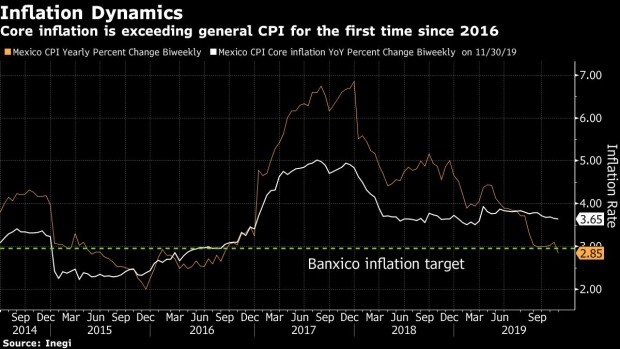Jan 2, 2020
Mexico's Wage Boost Could Hurt Economy, Central Bank Says
, Bloomberg News

(Bloomberg) -- A 20% boost to Mexico’s minimum wage this year could have a negative impact on the country’s labor market just as the economy struggles with stagnation, some central bank board members said in the minutes to their latest monetary policy decision.
The bank known as Banxico lowered its benchmark interest rate by a quarter point to 7.25% on Dec. 19 as Latin America’s second-largest economy ground to a halt and inflation slowed to the 3% target.
Some board members said changes to the labor market may have been caused by the weak economy, while others pointed to the increase in salaries as a reason. One of them said there’s information suggesting President Andres Manuel Lopez Obrador’s wage policy has started to curb the creation of formal jobs.
Read More: Mexico Is About to Find Out If Minimum Wage Raises Kill Jobs
Lopez Obrador increased the minimum wage seven times the rate of inflation this year as part of strategy to fight poverty and inequality. This is a stark break from Mexico’s recent policies, when increases to the minimum salary barely topped inflation to help exporters to the U.S. keep costs down.
Some members of the central bank board said the wage increase will make it hard for policy makers to reach their inflation target going forward. Combined with warnings about the resilience of core inflation, the minutes don’t come across as “dovish,” Goldman Sachs senior economist Alberto Ramos wrote in a note to clients.
They “contain no direct or indirect signal that the now larger four-director majority that supported the 25 basis-point rate cut is ready to entertain the acceleration of the pace of rate cuts,” he said.
(Adds detail from minutes, comment from economist in final two paragraphs.)
To contact the reporter on this story: Nacha Cattan in Mexico City at ncattan@bloomberg.net
To contact the editors responsible for this story: Juan Pablo Spinetto at jspinetto@bloomberg.net, Walter Brandimarte
©2020 Bloomberg L.P.







